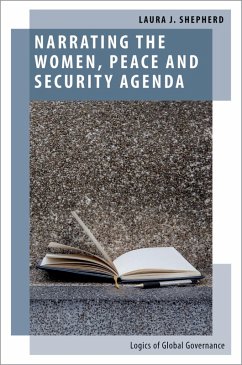The "narrative turn" has recently influenced theories, methods, and research design within the field of international relations. Its goal is, in part, to show how stories about international events and issues emerge and develop, and how these stories influence the uptake and limitations of global policy "solutions" around the world. Through the lens of narrative, this book examines the Women, Peace and Security (WPS) agenda, adopted by the United Nations Security Council twenty years ago. The agenda seeks to increase the participation of women in conflict prevention efforts and to protect the rights of women during conflict and peacebuilding. Those involved in the creation of the WPS agenda, including its strategies, guidelines, and protocols, tend to assume that implementation is the most critical element of it. But what can the stories about the agenda's emergence tell us about its limits and possibilities? Laura J. Shepherd examines WPS as a policy agenda that has been realized in and through the stories that have been told about it, focusing on the world of WPS work at the United Nations Headquarters in New York. She argues that to understand the implementation of the agenda we need to also understand the narration of the agenda's beginnings, its ongoing unfolding, and its plural futures. These stories outline the agenda's priorities and delimit its possibilities--as well as communicate and constitute its triumphs and disasters. As the book shows, much energy and resources are expended in efforts to reduce or resolve the agenda to a singular, essential "thing"--with singular, essential meaning. There is no "true" WPS agenda that practitioners, activists, and policymakers can apprehend and use as their guide; there is only a messy and contested space for political interventions of different kinds. Shepherd shows that the narratives of the WPS agenda incorporate plural logics but that this plurality cannot--should not--be used as an alibi for limited engagement or strategic inaction. Those seeking to realize the WPS agenda might need to live with the irreconcilable, the irresolvable, and the ambiguous.
Dieser Download kann aus rechtlichen Gründen nur mit Rechnungsadresse in A, B, BG, CY, CZ, D, DK, EW, E, FIN, F, GR, HR, H, IRL, I, LT, L, LR, M, NL, PL, P, R, S, SLO, SK ausgeliefert werden.

